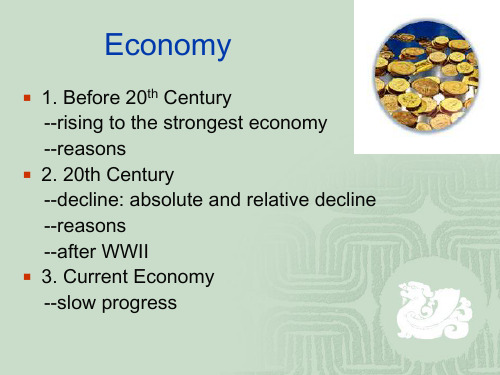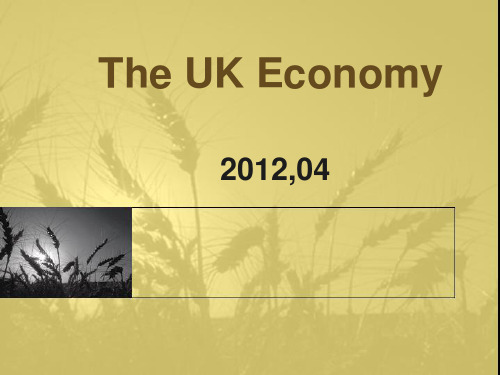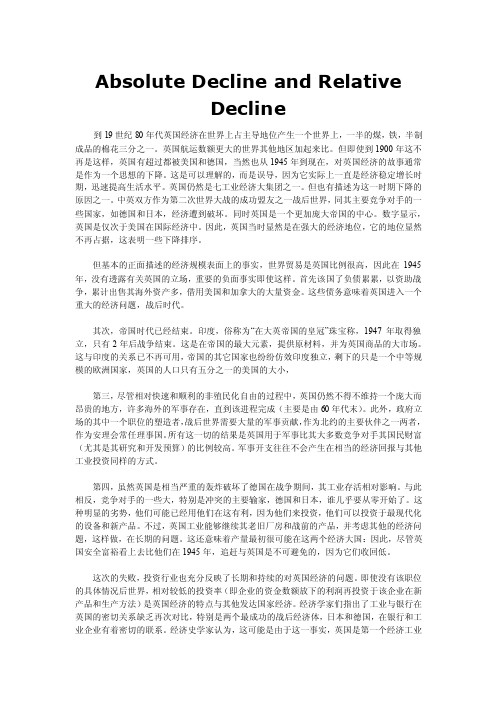英国economy
- 格式:ppt
- 大小:86.50 KB
- 文档页数:37

英国经济英语作文The British economy is facing some challenges at the moment. Many businesses are struggling to stay afloat due to the impact of the pandemic. The high street has been hit particularly hard, with many shops and restaurants closing down. It's a tough time for small business owners and employees alike.On the other hand, the tech industry in the UK is booming. Many startups and tech companies are seeing rapid growth and success. This has been a bright spot in an otherwise difficult economic landscape. It's great to see innovation and entrepreneurship thriving in the face of adversity.The government has implemented various measures to support the economy during this time. From furlough schemes to business grants, there has been a range of support available to businesses and individuals. However, there are still concerns about the long-term impact of the pandemicon the economy.Brexit has also had a significant impact on the British economy. The uncertainty surrounding trade deals and regulations has created challenges for many businesses.It's still unclear what the full impact of Brexit will be, but it's likely to continue shaping the economic landscape for years to come.Overall, the British economy is facing a complex set of challenges. While there are some bright spots, there are also significant struggles for many businesses and individuals. It's a time of uncertainty and change, and the full impact of recent events is yet to be fully understood.。




Absolute Decline and RelativeDecline到19世纪80年代英国经济在世界上占主导地位产生一个世界上,一半的煤,铁,半制成品的棉花三分之一。
英国航运数额更大的世界其他地区加起来比。
但即使到1900年这不再是这样,英国有超过都被美国和德国,当然也从1945年到现在,对英国经济的故事通常是作为一个思想的下降。
这是可以理解的,而是误导,因为它实际上一直是经济稳定增长时期,迅速提高生活水平。
英国仍然是七工业经济大集团之一。
但也有描述为这一时期下降的原因之一。
中英双方作为第二次世界大战的成功盟友之一战后世界,同其主要竞争对手的一些国家,如德国和日本,经济遭到破坏。
同时英国是一个更加庞大帝国的中心。
数字显示,英国是仅次于美国在国际经济中。
因此,英国当时显然是在强大的经济地位,它的地位显然不再占据,这表明一些下降排序。
但基本的正面描述的经济规模表面上的事实,世界贸易是英国比例很高,因此在1945年,没有透露有关英国的立场,重要的负面事实即使这样。
首先该国了负债累累,以资助战争,累计出售其海外资产多,借用美国和加拿大的大量资金。
这些债务意味着英国进入一个重大的经济问题,战后时代。
其次,帝国时代已经结束。
印度,俗称为“在大英帝国的皇冠”珠宝称,1947年取得独立,只有2年后战争结束。
这是在帝国的最大元素,提供原材料,并为英国商品的大市场。
这与印度的关系已不再可用,帝国的其它国家也纷纷仿效印度独立,剩下的只是一个中等规模的欧洲国家,英国的人口只有五分之一的美国的大小,第三,尽管相对快速和顺利的非殖民化自由的过程中,英国仍然不得不维持一个庞大而昂贵的地方,许多海外的军事存在,直到该进程完成(主要是由60年代末)。
此外,政府立场的其中一个职位的塑造者,战后世界需要大量的军事贡献,作为北约的主要伙伴之一两者,作为安理会常任理事国。
所有这一切的结果是英国用于军事比其大多数竞争对手其国民财富(尤其是其研究和开发预算)的比例较高。

英国经济的发展历程The development of the British economy has a long and rich history that spans several centuries. From its beginnings as a predominantly agricultural nation to becoming one of the world's leading industrial and financial powers, the British economy has experienced significant growth and transformation.The early stages of the British economy were characterized by agriculture and trade. During the Middle Ages, England emerged as a major producer of wool, which was in high demand across Europe. The growth of trade led to the establishment of markets and the formation of guilds, which further contributed to the development of the economy.The Industrial Revolution, which occurred in the late 18th and early 19th centuries, marked a turning point in the history of the British economy. It brought about a shift from an agrarian to an industrial society, with the adoption of new technologies and the rise of factories. Key industries such as textiles, iron and coal mining, and steam power flourished during this period. The development of the railway network also played a crucial role in connecting different parts of the country and facilitating trade. The British Empire, which at its height encompassed a quarter of the world's landmass and population, played a significant role in the expansion and prosperity of the British economy. Colonies provided valuable resources such as cotton, sugar, and tea, which fueled the growth of industries back in Britain. The empire also served as a vast market for British goods, further boosting economic activity. The wealth accumulated from the coloniescontributed to the development of infrastructure and the establishment of financial institutions, making London the global financial center.However, the decline of the British Empire after World War II coincided with economic challenges for the country. The cost of maintaining colonies and the rise of nationalist movements led to decolonization, reducing Britain's access to colonial markets. Additionally, the devastating effects of the war left the British economy in ruins, with shortages of essential goods and high levels of debt.In the post-war period, the British government adopted a policy of mixed economy, with a combination of state intervention and private enterprise. The welfare state was established, providing social benefits such as healthcare and education to all citizens. The nationalization of key industries such as coal, gas, and electricity aimed to ensure their efficient management and address inequalities.In the late 1970s, the British economy faced another crisis characterized by high inflation, rising unemployment, and industrial unrest. This led to a shift towards neoliberal policies under the leadership of Margaret Thatcher. The government took measures to reduce the power of trade unions, deregulate industries, and privatize state-owned enterprises. These reforms aimed to enhance competition, increase productivity, and attract foreign investment.Since then, the British economy has experienced periods of growthand recession, influenced by global economic trends and domestic policies. The financial services sector, centered in the City of London, has become a significant driver of economic activity. The country has also diversified its economy, with strong sectors in manufacturing, technology, and creative industries.In recent years, the UK's decision to leave the European Union, known as Brexit, has created uncertainty and posed challenges to the economy. The long-term impact of this decision is yet to be fully realized.In conclusion, the development of the British economy has been shaped by a complex mix of factors including agriculture, trade, industrialization, colonialism, and government policies. It has evolved from a primarily agricultural society to a global economic power, with both periods of prosperity and challenges along the way. The future of the British economy will continue to be influenced by global dynamics and the country's ability to adapt and innovate.。
英文作文英国经济The British economy has been facing some challenges in recent years. The uncertainty surrounding Brexit has had a significant impact on businesses, with many choosing to delay investment decisions until there is more clarity on the UK's future relationship with the EU.The service sector is a key driver of the UK economy, accounting for around 80% of GDP. However, the manufacturing sector has been struggling, with many companies feeling the effects of global trade tensions and a slowdown in the global economy.The UK government has been taking steps to boost the economy, including increasing public spending on infrastructure projects and providing support for businesses through tax breaks and incentives.Despite these challenges, the UK economy has shown resilience, with unemployment at its lowest level indecades and wages starting to rise. However, there arestill concerns about the impact of Brexit and the potential for further economic disruption.Overall, the British economy is facing some tough challenges, but there are also opportunities for growth and development. It will be important for the government to continue to support businesses and provide a stable environment for investment in order to ensure long-term prosperity.。